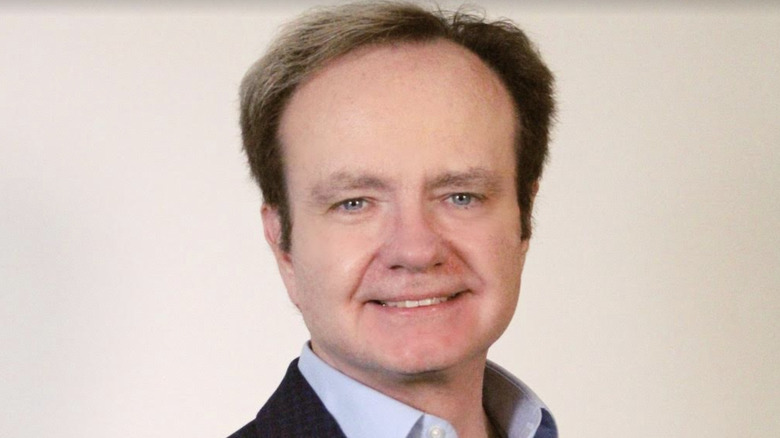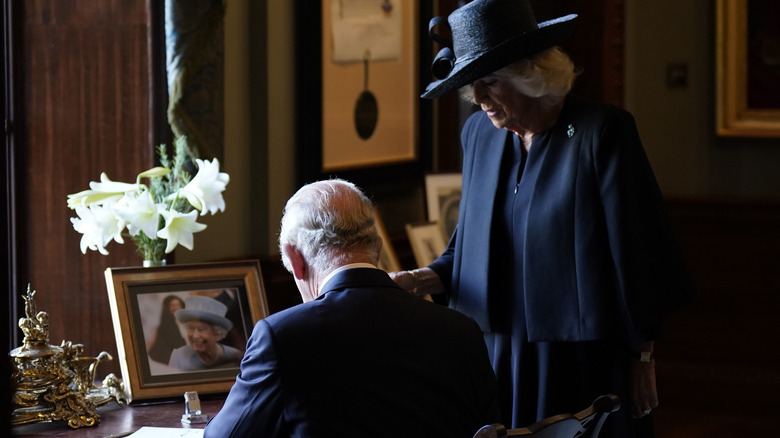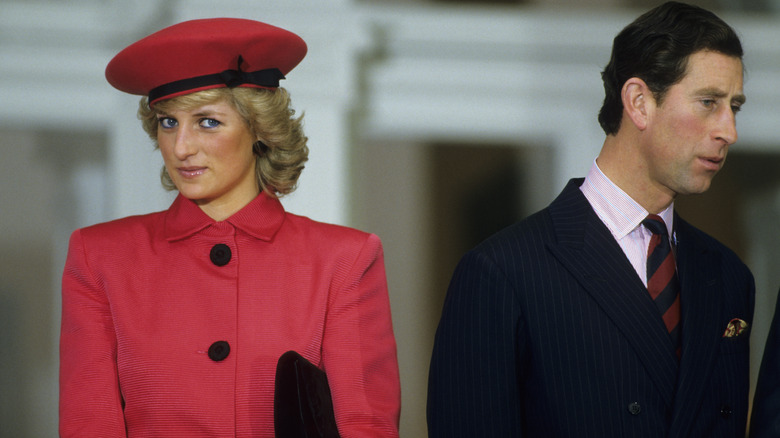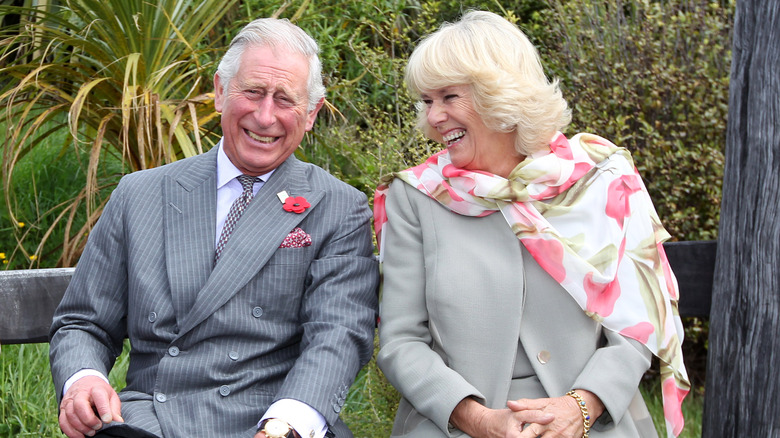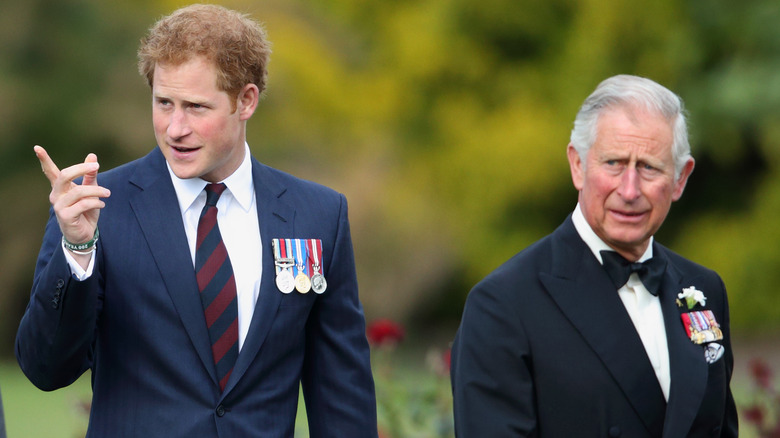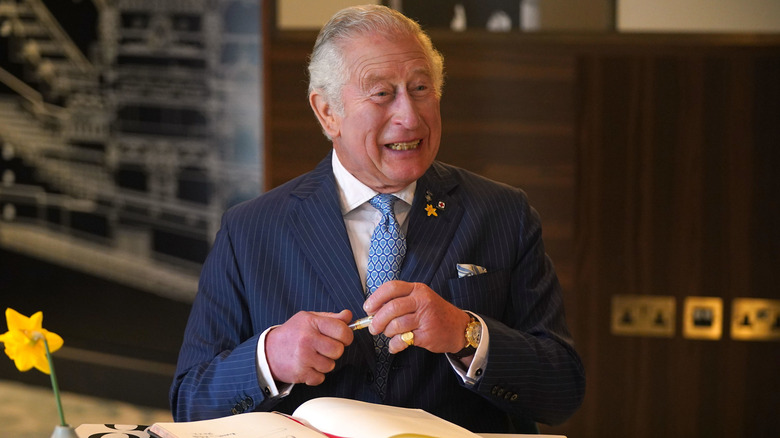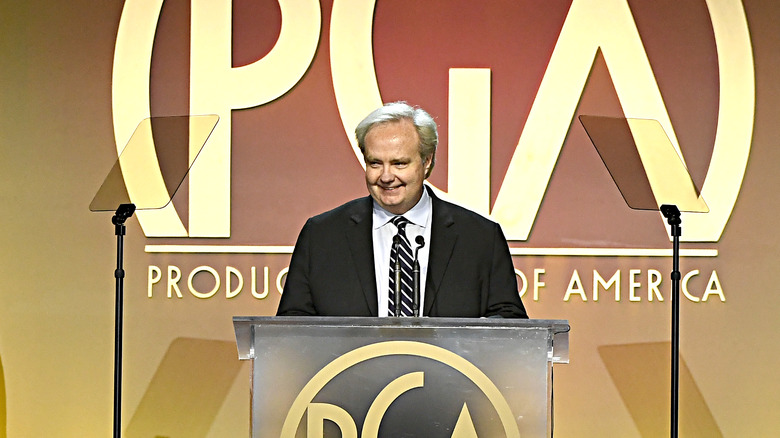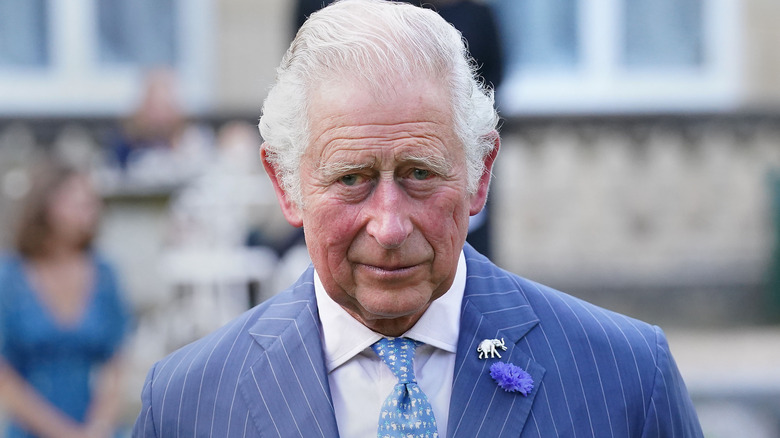Tom Jennings Discusses New Documentary Charles: In His Own Words - Exclusive Interview
When it comes to the British royal family, Tom Jennings has become somewhat of an expert. For starters, he was the executive producer of the acclaimed documentary "Diana: In Her Own Words," utilizing personal audio recordings the princess had made for biographer Andrew Morton, which had never before been heard by the general public. Now, Jennings is back with "Charles: In His Own Words," a new documentary made for National Geographic exploring the new king's life to date. "With someone like [King] Charles, there's so much [footage]," Jennings told The List. "We could have easily done 20 hours. I was sad when I re-watched the film the other day for the first time, as I thought, 'God, it just ends.' I'm thinking of all the stuff we didn't use because there's no time in a one-hour documentary."
Jennings founded production company 1895 Films, which has created multiple award-winning documentaries in recent years. "The beautiful thing about watching how my staff and I put these together is that it looks so effortless when it's done, not knowing the tears that went into every one of them," he explained. "We do a lot of work so that anyone who sees this can sit back and feel like they've been taken on a journey."
In an exclusive interview with The List, Jennings discussed "Charles: In His Own Words," the king's relationship with Prince Harry, and making a documentary about Princess Diana.
Finding inspiration in King Charles' leaky pen
The beginning of the documentary references King Charles's altercation with that leaky pen at Hillsborough Castle near Belfast in September 2022. Why was it important to start "Charles: In His Own Words" with that moment?
There's several good reasons for that. One is when we first started talking with National Geographic, one of the mandates was that we didn't want this to be yet another biography of [King] Charles. We didn't want it to be a linear storytelling of, "He was born and then this happened, and then he did this ..." In talking with [National Geographic], I said, "You know, the story starts for us the day the queen dies." We needed a modern throughline to take us along in the story to make it feel current and contemporary. We took a handful of events from the modern timeline, from the day the queen passed until as far as we could take it, until we delivered the show. We used certain events as themes to explore Charles' past so that we could go back in time and not be locked into a chronological telling of his story.
We picked [the moment with the leaky pen] not because it's humorous — in a way it is, of course — but it showed that no matter what he does, no matter what he says, big or small, whether it's a pen or commenting about wars in the world or architecture, environment, it's more than noticed. That particular moment blew up, and the headlines were, "What a drip he is," and things like that. We chose that to introduce the idea that Charles is under the spotlight, and he has been since the day he was born. No matter what he does, large or small, it's going to be noticed and amplified in ways that a normal human being would never have something in their lives amplified. We used [the leaky pen] as part of the current timeline as a way to show that something relatively insignificant can be twisted. Talk shows were talking about his reaction to the pen, and we found it fascinating. Plus, there was footage of it, and there was a major media reaction, and that was the section that we were introducing.
It makes him quite relatable.
I'd be upset too. I don't blame him for that, and I'm not a royalist. Being an American, we have no dog in this fight. It's funny that we're the ones telling his story, but National Geographic liked that we're the ones telling his story, especially because my company [produces] a lot of these archive films, and we do them fairly well. But we have an outsider's point of view. We're not quite as judgmental because we're not living with it every day, like [people] in the U.K. are.
Listening to Princess Diana's private recordings
You were also the executive producer on "Diana: In Her Own Words." What was it like listening to her private conversations and interviews that most people hadn't heard before?
It was the 20th anniversary of [Princess] Diana's passing coming up. National Geographic said, "Hey, can you [make] one of those archive [films]?" I said, "Yeah, but [with] Diana, every shred of [her] archives has been gone over." They literally said, "You're a clever guy, Tom. You'll figure something out." I started my career as a newspaper reporter, a journalist in the United States, and I had remembered the story of Andrew Morton, [Princess Diana's biographer].
I remembered him because after Diana had passed, he announced, "For everyone who says I was an outright liar, it was actually Diana that told me all of this stuff. I have a bunch of tapes that she made for me for the book." ... I tracked down Andrew in London and I told him who I was and said, "I'd love to use the tapes," which no one had ever used before. His first words were, "Get in line, mate. You're the 2000th producer that's asked me for those tapes. I'm taking them to my grave." I said, "Andrew, wait. We do this completely differently. There's no narrator. We don't have any modern interviews. We would only use news reports from the time and only Diana's voice from your tapes. It'd be like she was narrating her own film." He said, "No one has ever asked me to do that before. When can you be in London?" I was in London the following morning at dawn from Los Angeles.
I went to his publisher's office. It was right out of "Harry Potter," as it should be — a book publisher in London. We went into a small writer's room, and I remember it distinctly because it was pouring rain and there was a skylight and the rain was boom, boom, boom, boom, all day long. He sat me down and said, "Well, are you ready?" and I said, "Yes, I'm ready." He had digitized the tapes, but he had not shared them with anyone. An assistant brought us a lot of tea, and we sat there for seven hours listening to Diana talk as if she was in the room with us. It was by far, professionally, one of the most magical days of my life.
It was incredible. Andrew and I didn't talk the whole time other than like, "Oh, I have to go to the toilet" or something. We didn't talk because she's so engaging. If you recall, she made those tapes with a good friend of hers named James Colthurst, who was friends with Andrew Morton. Andrew would write questions, he'd give them to James, James would go to the palace, they'd go find some quiet turret somewhere, as one does at Kensington Palace. He would have this conversation, but it was like she was talking to a very good friend whom she had known since high school. It was colloquial, very conversational.
As soon as [the tapes of Diana] finished, Andrew asked, "Well, what do you think?" The first thing I said is, "I can't believe her laugh." Because she laughs telling these stories. While you may have heard her once or twice laughing, not like this. This was like deep, satisfying, very happy — almost giddy sometimes — laughs. I'd never heard those sounds come from anything I had ever known of her.
Tracking Charles and Camilla's romance from the beginning
In "Charles: In His Own Words," you cover so many topics and you build a timeline of Charles's relationship with Camilla. Why do you think the public has finally warmed to them as a couple? Did you learn anything in particular while making the film?
I don't know what goes on inside his mind, even though that was the goal of the film, to try and figure out what really goes on inside his mind. I didn't know that he and Camilla had dated in 1970 when they were both single. Charles was told because they were an intimate boyfriend and girlfriend that Camilla was therefore no longer eligible to be queen — which [seems] shocking in our day and age, but perhaps not so much then, especially for the royal family. I was amazed to see that very early photograph of the two of them in the back of a car where the photographer didn't even know who she was and identified her as a mystery woman. That was taken in 1975. The public, as much as they love Diana, I don't think time will heal that wound completely. Say what you want, but he's remained true to Camilla the whole time since 1970. After a while, it's like, "He's been with her for 53 years. Maybe it's time to say 'Okay.'"
In many ways, [King Charles] plays a long game that people are not cognizant of when he is doing it. Everything seems chaotic, and he's more calculating. I don't mean that in a derisive way. I think he thinks things through, not just the here and now, not just in a month, not just even in a year. He has far horizons on his mind, and I think Camilla was part of that. He hoped for the best. He would keep writing it.
I don't think he treated Diana well at all, but he managed to get through it. He managed up until a couple of years ago to have what seemed to be a good relationship with his sons, which also helped people warm up to the idea that Camilla was his wife and the queen consort. Although I'm very confused by the whole losing the consort and that she's now queen. That didn't seem to go over very well. It reminded me of the movie "Amadeus" — "Too many notes; too many words." Let's call her queen and get on with it.
King Charles' fractured relationship with Prince Harry
The documentary explores Charles' relationship with his sons. Do you think there's a way back for Charles and Harry?
I saw a headline this morning that for the coronation, [Charles] picked a family photo that [featured] Harry and Meghan. Again, I think he's playing some kind of long game, at least with Harry. I think Harry is very, very upset about losing his mom at such a young age. My mom died when I was very young, and it is not something you get over easily, or really ever. But he needed to lay blame for it, and he's caught up in this cacophony of royalty and media. This is from what I've learned about [Charles in] making [the documentary] ... knowing how he slowly let the Camilla story continue to evolve to the point where she's now almost beloved in some circles and she is now the queen as he had probably wanted her to be in 1970. I think Charles has a much longer game in his mind with his sons than any of us recognize.
You touched on the media scrutiny that he's faced his entire life and his difficult childhood. You even included photos of paparazzi following him while he was windsurfing, for instance. He can't get away from it.
When he was skiing in Switzerland, he said, "It's just too much." You think, "You're the Prince of Wales. What do you care?" But then you see the windsurfing and 50 photographers, and they're not scattered around along the railing of that deck. They're all crammed up right on the bow so they can all elbow their way in for the best shot. After a while, you'd think, "Don't we have enough pictures of this guy?"
He can't have a normal life. He can't even hit the beach.
He has no normal life. One of the main themes, if not the main theme [of the documentary], is his relationship with the media, how the media treats him, how he uses the media to his advantage. It takes a special kind of person with a depth to them to live their life in a fishbowl. He's like the Marilyn Monroe of the royal family. When you think about it, with Diana gone, he's the target of all those lenses. And I don't like someone taking my picture with an iPhone.
Exploring King Charles' 'meddling'
You mention the "black spider memos" in "Charles: In His Own Words," which don't get talked about enough. Do you think he'll ever stop writing letters and lobbying the government? I couldn't believe the number of letters he writes in a year.
1800 a year. When did he have time to do anything else? He says that he recognizes that ... Well, he wasn't supposed to be doing that, even as the Prince of Wales, as a member of the royal family, to be involved in politics or economics, things like that. But he went ahead and did it. Anyway, one of the chapters is called the "Rebel Prince," how he became a rebel prince, how he won crowds over in Wales in 1969 with his investiture, how he pulled that off. He was doing this long game stuff that we've been talking about when he was 19. I couldn't tie my shoes when I was 19, barely.
Again, this is my opinion — I'm not basing it on anything other than what I've learned [from] hundreds of hours and thousands of photographs that people have not seen. I think he's going to continue to meddle, as he says at that one point. He'll be more deft about it, perhaps. He talks about streamlining the monarchy, modernizing the monarchy. I don't know where is it written that a monarch can't be involved in politics.
Maybe his long game is, "It's not written down. We've done it that way for so long. Everyone wants the monarchy to evolve and therefore, as king, I think it should evolve in a way that allows me to stand up in Parliament and say, 'We need to do something about global warming.'" Again, I think it'll be gradual and slow. Much like with Camilla, the trigger will get pulled, and all of a sudden he's talking about global warming.
It's interesting that he was talking about climate change decades ago, and no one listened to him. People laughed at him, and it turned out he was right.
He learned that. I liked that he was talking to that old farmer in Wales about planting trees and the notion of environmentalism was planted in him, not just there, but in touring around the country at that time when he was 19. He got the environmentalist bug and it's never left him, so good for him on that. He was way, way ahead of that issue.
Choosing a documentary subject
You've won a Peabody, and you've been nominated for a Pulitzer. How do you choose what subjects you are going to work on next?
Whatever they're buying, I always joke. Whatever the networks are buying — but we still have to convince them that it's a good idea ... In this case, we had done "Diana: In Her Own Words," and it was very successful. It did well for National Geographic, but if you recall, they licensed it to Netflix, and Netflix paired it with Season 4 of "The Crown" — so when you pulled up "The Crown," you had the little thumbnail saying, "If you like Season 4 of 'The Crown,' watch this." 50 million people watched our documentary, something extraordinary.
We did another [documentary] in 2020 called "Being the Queen," which was a similar format. That was much harder to do because the queen didn't say much, God rest her. After she passed, I talked with the London office and said, "Hey, we've done Diana, we did the queen, and that actually worked out really well" — even though there was not as much footage of her specifically speaking to things. I said, "Charles is going to be king, or he is technically the day after she died. We should do Charles."
Their first question was, "Is there enough material?" Having done a lot of these archival programs, I laughed and said, "Are you serious? Even I know off the top of my head how much material there should be in the world." We were right about that because there is a tremendous amount of material and a lot of material that was either broadcast once and forgotten or not broadcast at all. Oftentimes, we'll ask archival sources, "We don't want the cut-to-air piece. We want all the raw footage from that day." You'll be seeing an event, and even if you're familiar with it, you're seeing it through a different angle, a different shot.
In general, I try to pitch stories that I find fascinating, especially. We don't do only archive programming, but we do a lot of it because the networks like it and it wins awards and they're beautiful. Our goal is to make the story feel new and fresh, but also play like a movie. We had motion picture cameras going through 50 or 60 years of time. It's a massive jigsaw puzzle. It's our own personal matrix when we put these things together. I try to pick stories that I find fascinating, and I have to balance that with what the networks and streamers want as far as what they think will sell. You could do this format with anything or anyone if the footage exists. It's just how you put it together. The trick is to make it feel seamless.
Learning new things about King Charles
Tom Jennings [continued]: By choosing that modern motif, then diving into whatever the theme is — the Rebel Prince, Charles and the media, the parent prince with his son — it frees us in a way because we can move around in time. In one of my favorite parts, he was in Cambridge and did all those comedy skits, which I didn't know anything about. It was hilarious. He's doing these voices and then the bagpipes and he's flailing about, and then we went to an interview from the 1980s where he's saying, "Humor, it's such a great way to help reach an audience." Then he says that great line: "I read it in the newspapers, so it must be true." We held on to every frame before he moved on; you see his eyes moving around like he's saying, "That's a joke." He does have the timing thing down. I'll give him that.
Every single [documentary that we make], including this one, we'll get about halfway through and I'll say, "This is the one that's not going to work." Then my staff will be like, "It's going to work. We'll make it work. We'll find a way ..." Being a former journalist, I can promise you the context of everything that's presented [in "Charles: In His Own Words"] is accurate. We don't screw around with putting things in that are taken out of context from a different time or place or referring to something else.
Is there anything else you want people to know about this film?
I'd like people to watch it because they will be really surprised. For me, Charles was the headline caricature that we all know, in a sense. Charles is a much more complicated and complex person than most of the world either recognizes or is willing to give him credit for. There is so much more there than I expected to find. That's fascinating. The fact that he is now going to be the official king of the United Kingdom — it's going to be very interesting how he plays that out. His long game has not arrived. It's just beginning.
"Charles: In His Own Words" premieres on National Geographic on Friday, April 28, at 10:00 ET/9:00 CT. Stream the documentary on Hulu from Saturday, April 29, and on Disney+ from Friday, May 5.
This interview has been edited for clarity.
